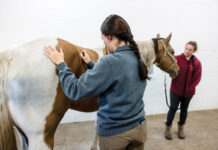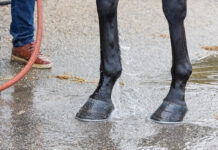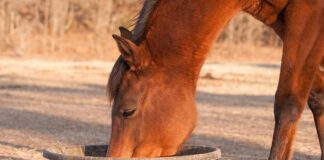Choke
Symptoms: Discomfort, repeated attempts at swallowing, agitation, coughing, food/saliva discharging through the nose, rolling.
What to do: Although many cases of choke resolve spontaneously, serious esophageal damage can occur if that doesn’t happen, so always call your vet immediately. Keep your horse calm and confine him in a stall or pen with no food or water. Walk him around if he tries to roll. Don’t try to flush water into his mouth or pass a stomach tube. Don’t give any medication unless you get the go-ahead from your vet.
Outlook: Horses that have experienced an episode of choke may be susceptible to recurrences, especially if the initial episode was prolonged and damaged the esophagus.Since horses that bolt their food (especially grain or pellets) are at risk to develop choke, preventive measures include feeding free-choice hay, feeding grain or pellets in several small meals throughout the day, feeding hay before grain or pellets, and placing large, smooth stones in the feeder with the grain or pellets so the horse has to eat more slowly.
Back to Horse Health Glossary
This article originally appeared in the 2012 issue of Horses USA. Click here to purchase the most recent issue.






